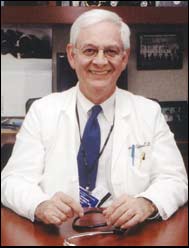Pioneer of PSA Screen Sounds Off

Hes the guy who pioneered the PSA test as a screening tool for prostate cancer.
He thinks doctors are dead wrong who think men with low PSA levels only need the test every other year. He also says men should start it at age 40, not 50, as most experts advise.
And he believes the biggest mistake patients make is going into denial or looking for “the easy way out.”
This is no newbie urologist we’re describing. Dr. William Catalona pioneered the PSA test as a screening tool, then further refined it into an even more definitive test, called the free PSA (the amount of PSA in the blood that’s floating free, as opposed to the attached type which binds to proteins and is a marker for cancer.) Known as one of the nation’s foremost urologists and researchers, Catalona is also expert at the nerve-sparing radical prostatectomy, the surgery designed to preserve bladder/sexual function.
Prostate cancer mortality has steadily declined since the PSA, an antigen made solely by the prostate gland that rises with cancer or certain benign conditions.
I talked to Catalona for Prostate Cancer Awareness Week and here in Q&A form is what he had to say:
Q. You pioneered use of the PSA. How do you think medical history will judge it?
A. I think PSA, when all is said and done, will be shown to have been a great marker, detecting prostate cancer earlier, and substantially reducing death and suffering. I think anyone who is experienced in this field would not want to go back to the days before we had PSA.
Q. Some doctors say that men with lower PSA levels only need a PSA test every other year. What do you say?
A. That’s as wrong as it can be. The men with rapidly rising PSAs have the life-threatening cancers. The only way you can tell is by measuring PSA every year. The best test we have of measuring aggressiveness is the PSA velocity (assessing changes in PSA levels over a span of time). There is no way of estimating PSA velocity unless you measure the PSA every year.
“Men should start screening at age 40.”
Q. What is the biggest mistake men make on a preventive basis with this cancer?
A. We don’t know much about how to prevent it. There’s a lot of speculation. Things like avoiding a high fat diet and animal meat are epidemiological findings, but not a home run at best, a bunt single. Men who have the perfect lifestyle can develop prostate cancer. I think the diet/meat thing is a little overblown.
The best strategy to keep from dying/suffering from prostate cancer is the annual PSA test, starting at age 40.
Q. At 40? The American Cancer Society says it should be offered at 50, except for blacks, or for Caucasians with a family history of prostate cancer, then it’s 45.
A. Prostate cancer deaths start occurring in men in their 40s; that means they must have developed it in their 30s. The other nice thing about starting in the 40s is that the reading should be less than one. Very few men in their 40s have chronic prostatitis, or even BPH (enlargement, or benign prostatic hyperplasia).
If you do the test every year when the level should be less than one, you could identify the relatively small fraction of men who have the life-threatening cases and catch them at the earliest times. Other benign conditions would have slow rises, but cancer would have rapid.
“Prostatectomy is the only treatment that completely removes the cancer from the body.”
Q. What’s the biggest mistake men make in treatment?
A. Once prostate cancer is detected early, the most effective treatment is removing the prostate before the cancer is spread. We see a lot of patients who ignore a rising level and go into denial.
Or they look for an easy way out, choosing some treatments that are not as effective, such as cryoablation, sub-zero freezing of cancer cells, or watchful waiting, or brachytherapy, the implanting of radium seeds.
Prostatectomy is the only treatment that completely removes the cancer from the body. All the others ionizing radiation, cold, heat leave the cancer in the body, and you have to rely on these treatments destroying every last cancer cell which is often not achieved. And then you have to treat the surrounding tissues. In many cases, this results in damage to the bladder, rectum, and sphincter muscle, with disastrous complications in a few cases.
Q. Accurate or not: One in six men will be diagnosed with prostate cancer sometime in his lifetime?
A. Diagnosed, yes. But more men will develop prostate cancer.
Critics say the PSA can also indicate non-cancerous conditions such as infection, inflammation, and enlargement, or will detect slow-growing cancers that would never cause death. Unnecessary biopsies, treatment, anguish often result, they say.
That can be true. But the top urologists I have talked to Patrick Walsh of Johns Hopkins; Peter Scardino of Memorial Sloan-Kettering, Michael Blute of Mayo Clinic, plus those in Cedar Rapids and Iowa City all hail the PSA as a life-saving measure, pointing out that more and more prostate cancers are found early through the PSA, and not already advanced, as was the case pre-PSA.
I say we should all be grateful the PSA is in our arsenal of cancer detection tools.







